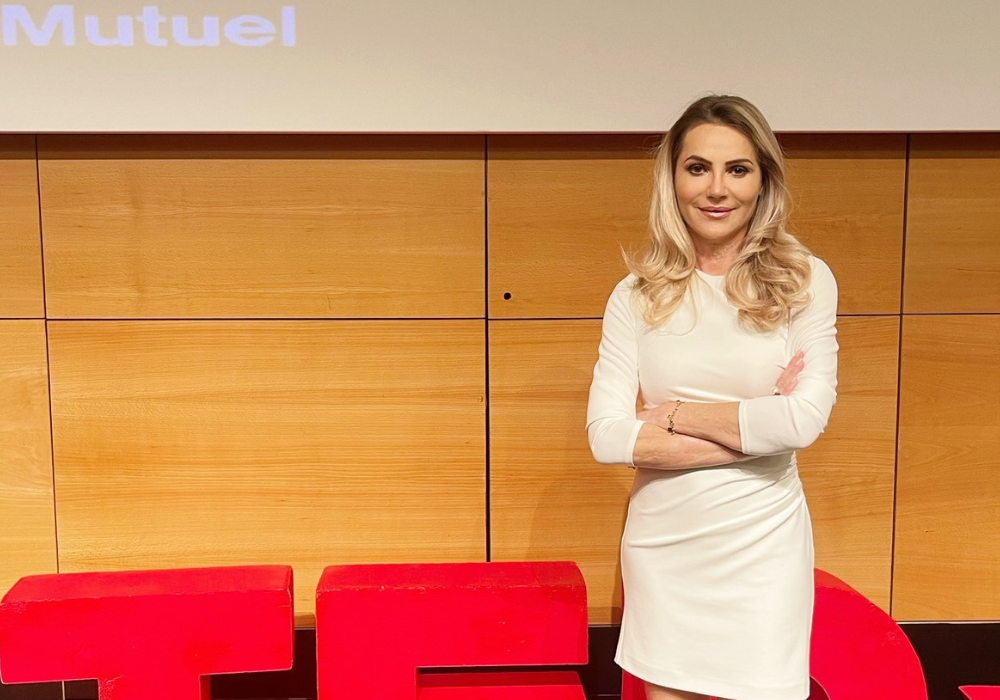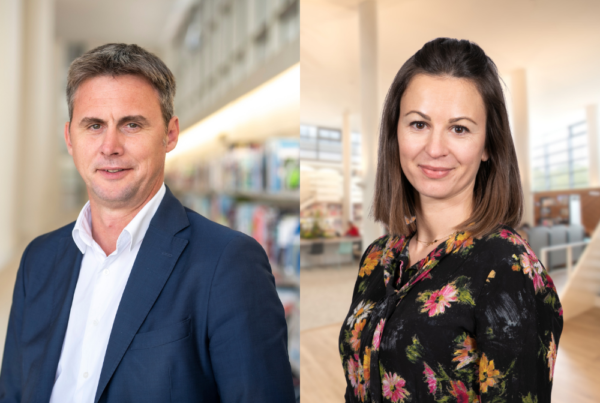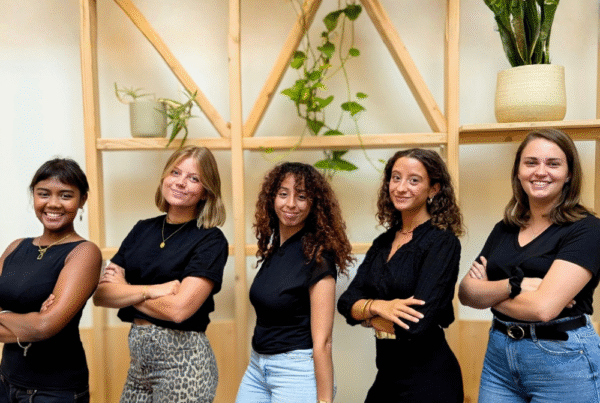
Stéphanie Gateau (ISMA 1991), a graduate of Audencia and founder of the inclusive start-up Handiroad, is a leading figure in the fight against discrimination. Awarded for her commitment, she campaigns for accessibility and embodies a new approach to disability. Through her personal and professional journey, Stéphanie invites us to rethink the inclusion of students with disabilities within schools, as the first step towards preparing them for a more inclusive world of work.
Q.1 : Can you talk about your experience at Audencia and the challenges you’ve faced along the way?
Both at Audencia and throughout my studies, I was confronted with a reality and obstacles that are hard to imagine until you’ve experienced them. Operating differently and being in an environment that was not designed to accommodate all profiles, whatever they may be, is a fundamental mistake in any organisation. Fundamental because it means that no thought was given at the outset to making studies accessible to all. Fundamental because it reflects a lack of awareness that, if we want to offer equal opportunities, we have to give ourselves the means to do so. Fundamental because studies and, more broadly, education and schooling are the first step in preparing for the world of work, and we are going to reproduce what we have experienced when we take on responsibilities.
If you haven’t been confronted with disability and difference, you won’t know how to do it in a company either.
The role of the school is therefore fundamental and the first building block in the edifice of the leaders we are training, who will perhaps be the future great bosses of this country. The difficulty is also contextual. In my day, we didn’t talk about disability and we didn’t yet look at the issues of inclusion in the way that you do today. In concrete terms, I sometimes had to face the stares of teachers who didn’t understand why I was staring at them (I’m deaf and I lip-read). I had to find tricks and exhausting ways of compensating to adapt. I hadn’t yet been diagnosed with ASD (Autism Spectrum Disorder) and ADHD (Attention Deficit Disorder with or without Hyperactivity). At that time, disability was still taboo and society reflected such a negative image of us that we were ashamed and tried not to be noticed, even to be invisible. The fact that I wasn’t prepared for the world of work was also a mistake, because when I found myself in front of recruiters, the shock was violent.
When I explained how I worked, I was promised 25 years of unemployment.
Today, we can identify the obstacles and barriers at all levels, work on cognitive biases and prejudices, and take action at all levels to ensure that disability is seen neither as charity nor as an option. Diversity must become the norm. The various players have an economic, moral and social responsibility. Fortunately, things are changing, even if too slowly. But awareness has finally been raised. All that remains is to define a deployment strategy to ensure that this discrimination – disability being the number one cause of discrimination in France – no longer exists.
Q.2 : “My disability is not me, it’s what’s added to me”. How does this statement by Bruno Gaurier resonate with your own experience and perception of disability?
I partly agree, but I don’t have quite the same point of view. As I see it, every human being has a different, unique “operating manual”. Whether it’s a disability, disorder, impairment or neurodiversity, my disability is also part of what defines me. It’s up to me to inform the people and the environment in which I find myself, otherwise I leave the person I’m talking to no chance of guessing.
80% of disabilities are invisible and 80% of the people affected don’t dare say it, which is tragic.
My disability is part of me and, of course, you can’t reduce a person to their illness or disability. What’s more, my disability has had an impact on my daily life, making me the person I am today and enabling me to develop other talents: agility, resilience, empathy and perseverance. It’s something to be proud of.

Photo credit: Caroline Bleux – Audencia Alumni Inspiring Conference, 13.06.2024

Photo credit: Caroline Bleux – Audencia Alumni Inspiring Conference, 13.06.2024
Q.3 : What types of resources and support do you think are essential to make inclusion a reality in all schools?
For me, there are two keys:
– Co-construction: it is together and collectively that we will be able to meet this challenge. We need to come up with solutions with the people concerned. Otherwise, we run the risk of creating something (a programme, material resources, etc.) that does not correspond to the needs. This is common sense.
– Have a real strategy with measurable objectives and action plans deployed at all levels. On the subject of inclusion, all too often we envisage actions without ordering them, prioritising them or having a real vision. It’s like conquering a market without monitoring or testing before the launch. You have to be professional, especially as you’re dealing with people, and that’s what your posture will say about you.
Too often, we limit ourselves to raising awareness or one-off actions such as DuoDay or the SEEPH, when disability is a year-round issue that involves meeting and accompanying people with disabilities.
The technological and digital aspect is often underestimated, as is the use of universal design tools that enable everyone to use them. In this respect, digital inclusion is essential to ensure equitable access for all students. Another example: access to sites is one thing, but access to knowledge is another. If I don’t have subtitles and I’m not close enough to read lips, I won’t be able to follow the course.
Q4. What still annoys you about the inclusion of people with disabilities (preconceived ideas, attitudes, etc.)?
Most of the time, prejudice and negative value judgements about disability are based on a lack of knowledge. So we need to educate people and enable those concerned to express themselves and reveal their views without fear. Safe Places to Work” could also be envisaged. What really annoys people with disabilities is validation, charity, or the fact that they are made to feel that they have been taken on to meet quotas. There’s also the fact that we do everything we can to adapt to the “able-bodied”, those who represent the norm, while on the other hand, nobody takes a step towards us, even if it’s just to ask us: “What do you need? or “What are you missing to get there?
As long as disability is not normalised, as long as we do not consider that a different ability is an asset, as long as differences are not valued and seen as a factor in performance, inclusion and diversity policies will fail.
Inclusion is the only way to embrace diversity, and without inclusiveness there can be no equality.
Q5. On the contrary, what makes you proud when you talk about this subject? What achievements or progress give you hope?
I don’t feel any pride, except in myself, for having managed to accept myself and overcome the obstacles. Having understood the keys to success when it comes to diversity and having committed myself to promoting this subject, because we’re talking about whole lives that can either unfold in the best possible way or be ruined because we don’t know how to welcome them. What gives me hope is the fact that we can finally talk about it, that we recognise – and this was seen at the Paralympic Games – that everyone can have talent, even if their talent is different from mine. The hardest thing remains to understand that one life is not worth more than another. I may be a little naive, but diversity, solidarity and mutual support can help us to imagine and build a fairer, more responsible world that is accessible to all. Everyone can contribute to this on a day-to-day basis or by working on high-impact issues. Finally, all the people I’ve had the chance to meet at Audencia are wonderful.
We need to take advantage of this to ‘break the mould’ of disability and turn it into a project that brings everyone together.
It can be a great collective success.

Photo credit: Caroline Bleux – Audencia Alumni Inspiring Conference, 13.06.2024



